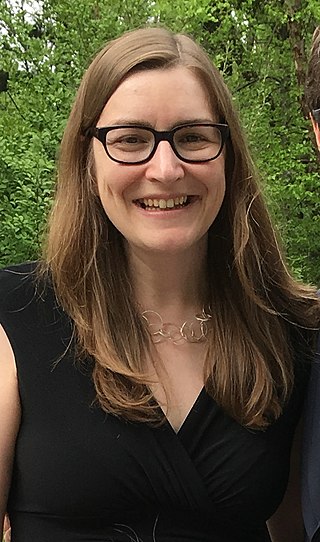Related Research Articles

The School of Informatics is an academic unit of the University of Edinburgh, in Scotland, responsible for research, teaching, outreach and commercialisation in informatics. It was created in 1998 from the former department of artificial intelligence, the Centre for Cognitive Science and the department of computer science, along with the Artificial Intelligence Applications Institute (AIAI) and the Human Communication Research Centre.
Nello Cristianini is a professor of Artificial Intelligence in the Department of Computer Science at the University of Bath.

Moshe Ya'akov Vardi is an Israeli mathematician and computer scientist. He is the Karen Ostrum George Distinguished Service Professor in Computational Engineering at Rice University, United States. and a faculty advisor for the Ken Kennedy Institute. His interests focus on applications of logic to computer science, including database theory, finite model theory, knowledge of multi-agent systems, computer-aided verification and reasoning, and teaching logic across the curriculum. He is an expert in model checking, constraint satisfaction and database theory, common knowledge (logic), and theoretical computer science.

Tomaso Armando Poggio, is the Eugene McDermott professor in the Department of Brain and Cognitive Sciences, an investigator at the McGovern Institute for Brain Research, a member of the MIT Computer Science and Artificial Intelligence Laboratory (CSAIL) and director of both the Center for Biological and Computational Learning at MIT and the Center for Brains, Minds, and Machines, a multi-institutional collaboration headquartered at the McGovern Institute since 2013.

Constantinos Daskalakis is a Greek theoretical computer scientist. He is a professor at MIT's Electrical Engineering and Computer Science department and a member of the MIT Computer Science and Artificial Intelligence Laboratory. He was awarded the Rolf Nevanlinna Prize and the Grace Murray Hopper Award in 2018.

Kathleen M. Carley is an American computational social scientist specializing in dynamic network analysis. She is a professor in the School of Computer Science in the Carnegie Mellon Institute for Software Research at Carnegie Mellon University and also holds appointments in the Tepper School of Business, the Heinz College, the Department of Engineering and Public Policy, and the Department of Social and Decision Sciences.
William Eric Leifur Grimson is a Canadian-born computer scientist and professor at the Massachusetts Institute of Technology, where he served as Chancellor from 2011 to 2014. An expert in computer vision, he headed MIT's Department of Electrical Engineering and Computer Science from 2005 to 2011 and currently serves as its Chancellor for Academic Advancement.
Ming Li is a Canadian computer scientist, known for his fundamental contributions to Kolmogorov complexity, bioinformatics, machine learning theory, and analysis of algorithms. Li is currently a University Professor at the David R. Cheriton School of Computer Science at the University of Waterloo. He holds a Tier I Canada Research Chair in Bioinformatics. In addition to academic achievements, his research has led to the founding of two independent companies.
Michael Justin Kearns is an American computer scientist, professor and National Center Chair at the University of Pennsylvania, the founding director of Penn's Singh Program in Networked & Social Systems Engineering (NETS), the founding director of Warren Center for Network and Data Sciences, and also holds secondary appointments in Penn's Wharton School and department of Economics. He is a leading researcher in computational learning theory and algorithmic game theory, and interested in machine learning, artificial intelligence, computational finance, algorithmic trading, computational social science and social networks. He previously led the Advisory and Research function in Morgan Stanley's Artificial Intelligence Center of Excellence team, and is currently an Amazon Scholar within Amazon Web Services.

Kathleen Shanahan Fisher is an American computer scientist who specializes in programming languages and their implementation.

Nathalie Michelle Sinclair is a Canadian researcher in mathematics education who holds the Canada Research Chair in Tangible Mathematics Learning at Simon Fraser University in Vancouver.

Paola Velardi is a full professor of computer science at Sapienza University in Rome, Italy. Her research encompasses natural language processing, machine learning, business intelligence and semantic web, web information extraction in particular. Velardi is one of the hundred female scientists included in the database "100esperte.it". This online, open database champions the recognition of top-rated female scientists in Science, Technology, Engineering and Mathematics (STEM) areas.
Anna Goldenberg is a Russian-born computer scientist and a full professor at University of Toronto's Department of Computer Science and the Department of Statistics, a senior scientist at the Hospital for Sick Children's Research Institute and the Associate Research Director for health at the Vector Institute for Artificial Intelligence. She is the first chair in biomedical informatics and artificial intelligence at the Hospital for Sick Children.
Marzyeh Ghassemi is a Canada-based researcher in the field of computational medicine, where her research focuses on developing machine-learning algorithms to inform health-care decisions. She is currently an assistant professor at the University of Toronto's Department of Computer Science and Faculty of Medicine, and is a Canada CIFAR Artificial Intelligence (AI) chair and Canada Research Chair in machine learning for health.

Cynthia Diane Rudin is an American computer scientist and statistician specializing in machine learning and known for her work in interpretable machine learning. She is the director of the Interpretable Machine Learning Lab at Duke University, where she is a professor of computer science, electrical and computer engineering, statistical science, and biostatistics and bioinformatics. In 2022, she won the Squirrel AI Award for Artificial Intelligence for the Benefit of Humanity from the Association for the Advancement of Artificial Intelligence (AAAI) for her work on the importance of transparency for AI systems in high-risk domains.
Bonnie Jean Dorr is an American computer scientist specializing in natural language processing, machine translation, automatic summarization, social computing, and explainable artificial intelligence. She is a professor and director of the Natural Language Processing Research Laboratory in the Department of Computer & Information Science & Engineering at the University of Florida. Gainesville, Florida She is professor emerita of computer science and linguistics and former dean at the University of Maryland, College Park, former associate director at the Florida Institute for Human and Machine Cognition,, and former president of the Association for Computational Linguistics.
Maria-Florina (Nina) Balcan is a Romanian-American computer scientist whose research investigates machine learning, algorithmic game theory, theoretical computer science, including active learning, kernel methods, random-sampling mechanisms and envy-free pricing. She is an associate professor of computer science at Carnegie Mellon University.

Jennifer (Jenn) Wortman Vaughan is an American computer scientist and Senior Principal Researcher at Microsoft Research focusing mainly on building responsible artificial intelligence (AI) systems as part of Microsoft's Fairness, Accountability, Transparency, and Ethics in AI (FATE) initiative. Jennifer is also a co-chair of Microsoft's Aether group on transparency that works on operationalizing responsible AI across Microsoft through making recommendations on responsible AI issues, technologies, processes, and best practices. Jennifer is also active in the research community, she served as the workshops chair and the program co-chair of the Conference on Neural Information Processing Systems (NeurIPs) in 2019 and 2021, respectively. She currently serves as Steering Committee member of the Association for Computing Machinery Conference on Fairness, Accountability and Transparency. Jennifer is also a senior advisor to Women in Machine Learning (WiML), an initiative co-founded by Jennifer in 2006 aiming to enhance the experience of women in Machine Learning.
Angela P. Schoellig is a German computer scientist whose research involves the application of machine learning to the control theory of robot motion, especially for quadcopters and other flying devices. She is an Alexander von Humboldt Professor for Robotics and Artificial Intelligence at the Technical University of Munich, and an associate professor in the University of Toronto Institute for Aerospace Studies (UTIAS).
Marina Lvovna Gavrilova is a Russian-Canadian computer scientist whose research interests include machine learning, data fusion, and biometrics, including the use of behavioral characteristics to unmask anonymous social network contributors. She has also published well-cited research on the use of Voronoi diagrams in path planning. She is a professor of computer science at the University of Calgary in Canada, where she holds a UCalgary Research Excellence Chair. She is also the editor-in-chief of Transactions on Computational Sciences.
References
- ↑ "Sandra Zilles: Canada Research Chair in Computational Learning Theory". Canada Research Chairs. Government of Canada. Retrieved 2023-06-22.
- 1 2 3 "Dr. Sandra Zilles". Computer science faculty. University of Regina. Retrieved 2023-06-22.
- 1 2 "Curriculum vitae" . Retrieved 2023-06-22.
- ↑ Sandra Zilles at the Mathematics Genealogy Project
- ↑ "National honours for computer scientist Sandra Zilles". University of Regina. May 1, 2014. Archived from the original on 2014-08-14.
- ↑ Johnson, Dale (October 5, 2016). "Feature Story: Computer science professor is named a top young scholar". University of Regina. hdl:10294/7337.